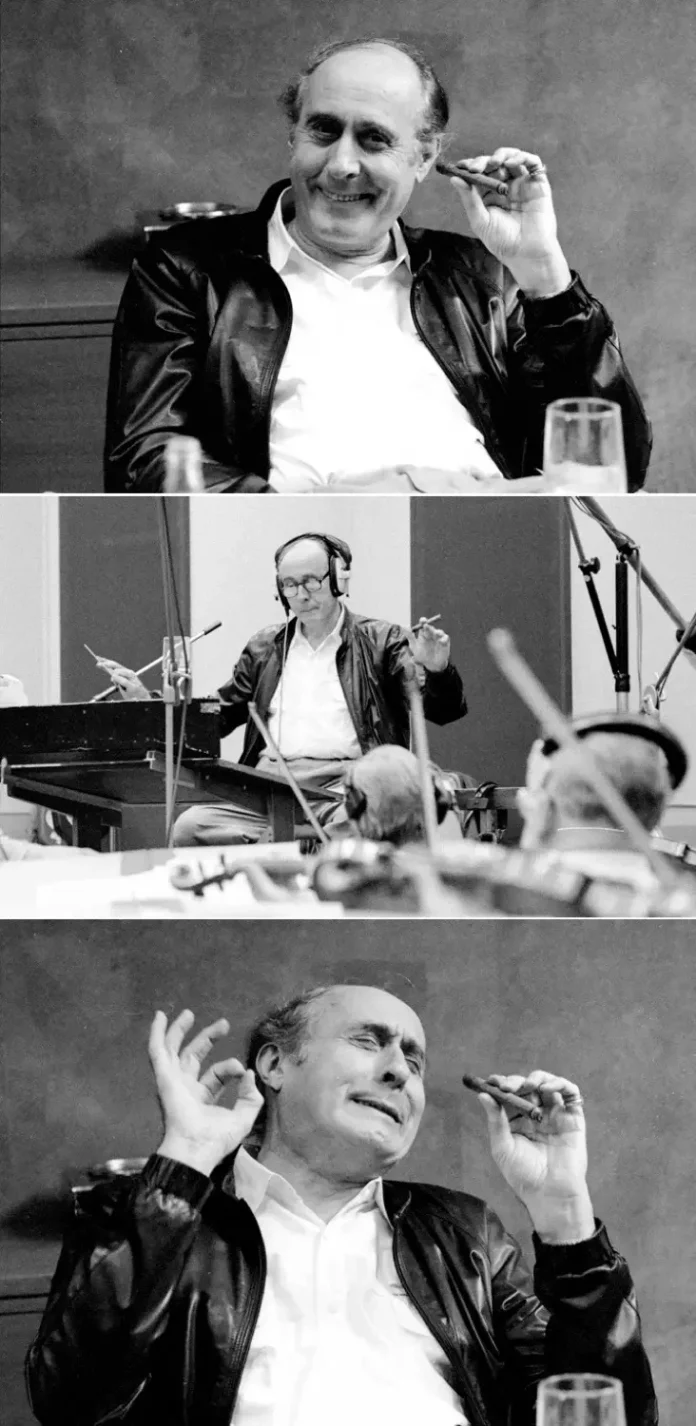
Although celebrated the world over as the composer of film songs – Moon River, Charade, The Pink Panther, The Days Of Wine And Roses – Henry Mancini enjoyed an early success when he composed (and later recorded) the score for Peter Gunn, a television series in which the eponymous character is a jazz-loving private eye. Many of those film songs were adopted as jazz standards, but the music he wrote for Peter Gunn was directly designed as jazz.
Born in Maple Heights, Ohio, 16 April 1924, Mancini was christened Enrico Nicola Mancini. He began learning the flute aged eight and switched to piano four years later. His principal interest was in arranging rather than performing, and in his teens, he placed one of his charts with a still relatively unknown Benny Goodman orchestra. In 1942 he won a place at Juilliard, after auditioning with a Beethoven sonata and variations on Cole Porter’s Night And Day.
At 18 he enlisted in the United States Air Force, where he remained for three years, beginning his professional career on his discharge in 1946 as pianist and arranger with the newly reformed Glenn Miller orchestra, now led by Tex Beneke. In 1952 he joined the music department of Universal International Film Studios, where, during the next six years, he scored a hundred films, including The Glenn Miller Story, The Benny Goodman Story and Orson Welles’s Touch Of Evil. In 1958 he went freelance, almost immediately becoming involved with the Peter Gunn project.
Peter Gunn was a television series that ran for three seasons, initially produced (first two seasons) by NBC, and later (third season) by ABC. It was unique in that it was the first time on television that the eponymous character was an original conception, rather than an adaptation from other media. Gunn was the conception of writer and director Blake Edwards, who also wrote 39 and directed nine of the eventual 114 episodes.
Excellent though the production values were, it’s fair to say that Peter Gunn is today best remembered for Mancini’s jazz score. Edwards attempted to create a private eye cast in a slightly different mould to the usual slightly shop-worn, hard-boiled examples, making Gunn a well-dressed sophisticate with expensive tastes and a penchant for cool jazz, whose “office” is a small jazz club called Mother’s, with mother herself a pianist and singer. The show is credited with creating a trend for TV shows with a jazz element. Along with Leith Stevens, Johnny Mandel, Alex North and Elmer Bernstein, Mancini pioneered the introduction of jazz into film and TV scoring.
Apart from the jazz musicians – including Pete Candoli, Ted Nash, Ronny Lang and John Williams – who played on the Gunn soundtrack, others – e.g., Shorty Rogers, Shelly Manne and Laurindo Almeida – actually appeared on screen in featured scenes.
The instantly recognisable Peter Gunn theme was released as a single and covered many times – by artists as diverse as Duane Eddy and Emerson, Lake & Palmer. An album of the music, The Music From Peter Gunn was released in 1959. The album’s 12 tracks featured the cream of West Coast studio and jazz players, including Ray Linn, Conrad Gozzo, Pete Candoli, Dick Nash, Victor Feldman, Shelly Manne and Alvin Stoller. The album spent 10 weeks in the number-one spot on the charts and picked up two Emmys and one Grammy. The album was followed the same year by More Music From Peter Gunn. Both albums were collected on a Fresh Sound CD, The Jazz Sound From Peter Gunn. However, the critical view is that the Shelly Manne sextet’s 1959 recording of Peter Gunn tunes for Contemporary (also reissued on Fresh Sound) was more jazz-orientated.
For the general public Mancini was the man who wrote tunes with such household names as Moon River, The Pink Panther, Charade and Days Of Wine And Roses. Away from popular music, he conducted leading symphony orchestras in hundreds of concerts a year and wrote 98 film scores. That’s impressive, but for jazz fans he’s most remembered for Peter Gunn and a good handful of jazz standards.















